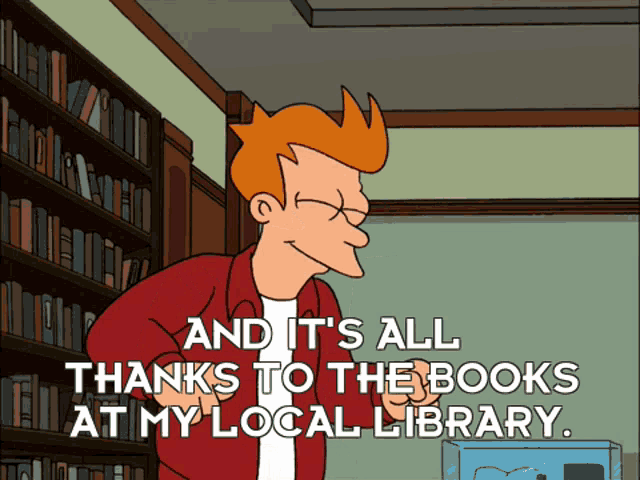Piracy is for Posers: How I read 100+ books a year with only lint in my wallet
Also, addressing some excuses people make for piracy.
I dunno, guys, I’m just gonna come out and say it: books are pretty rad. A notable rad feature of books is that they’re one of the few things that can still be completely (and legally) free.
I shrugged off writing about this topic for a while, because I figured it was common sense. But I’m running into more and more people who, though they might be avid readers, aren’t aware of all the options they have to be as stingy as they please.
And I am stingy. Last year, I acquired ~40 new books, and I don’t think I spent more than 15 dollars, and that entire 15 went towards indies. (I am Very Unemployable.) So, here’s my arsenal of strats:
The Library (IRL)
I’m not explaining this one. Instead, I need people who don’t use the library to explain themselves to me. Tell me why, even when I worked at a bookstore, I was the only person on staff who used the beautiful, heavenly halls of the library? Weirdos.
The Library (Online)
“Wow Vanessa how do you read a truly silly amount of random graphic novels?”
My best friend, Hoopla
The first in a duo of app-based library catalogues with painfully 2020’s brand names. Hoopla is mainly a hub for comics and manga.
The offerings depend on your local library, but in my case, there’re more titles than I could ever hope to read, and the catalogue’s updated frequently with everything from Dark Horse’s frontlist to whatever random stuff Silver Sprocket’s got going on.
Hoopla also has music, television, movies, audiobooks, and eBooks. These can be…um…interesting. It’s not uncommon to find an acclaimed film like Mona Lisa Smile or The Handmaiden right next to something you’ve never heard of and looks like it’s from the floor of a 2001 Blockbuster, gathering dust after it fell between the shelves. It’s such a mixed bag, but that means I’ve read/watched some titles that no one else carries.
Libby
The more popular golden child of the two, Libby’s focus is audiobooks. They acquire all the popular stuff almost instantly. They also have eBooks, comics, and extensive, no-hold magazine backlogs.
Advance Review/Reader Copies
You know what these are; chances are you’ve even distributed some yourself! So, where to find them as a reader? (Besides, of course, making friends with fellow authors or following their social media.)
Indie Press ARC Teams
Find a small press whose style you really jive with? See if they have a designated hype team—err, that is, an ARC team! ARC readers are invaluable to small presses or indie authors, helping them get traction for later sales. Writing reviews or making social media posts lets you support them in a fabulous way that makes a real difference, even if you can’t lend a hand monetarily.
NetGalley
This online catalogue of ARCs is (APPARENTLY) very friendly to your average book blogger—though they’ve always hated me in particular. My grudge is eternal and the list of books they rejected me for is infinite. Though my pals swear by it. They mainly carry trad pub, with some small presses on the side.
Edelweiss.Plus
I’m an Edelweiss girlie. Yes, the layout is 1998-ugly, and it’s built for booksellers (every book comes with a list of comp titles, the publisher’s marketing strategy, and “key selling points,” oh joy!), but I will be using my bookseller account until they investigate me for my lies.
They exclusively carry trad pub. A pretty high proportion of these books don’t require you to request a copy and are instantly available.
Book Sirens / Booksprout
These two are almost entirely self-pub. These don’t only have advance copies—a lot of the books are just review copies, regardless of when the book came out.
They can be a mixed bag, with some high-production indies and some that kinda…well, to be nice, they’re doomed to be the weird muck lying on the bottom of Amazon’s ocean and making the rest of us look bad. Still, lots to scroll through and enjoy.
Be a discerning scroller and enjoyer, though—keep an eye out for AI-generated covers (remember what I just said about muck…). I have contacted these sites, getting absolutely ghosted when I asked if they have any stopgaps to keep out AI-generated text. That tells me there are no stopgaps at all. But let’s be real. It’s so easy to spot the ChatGPT crap.
A note on that “Review Copy” thing…
By taking these books, you’re making a pinkie promise with the author that you’ll leave a review.
I play way more fast and loose with this promise when it comes to trad books (I’m sure Simon & Schuster isn’t wringing their hands because they’re missing my Goodreads review), and I am much quieter when I read an ARC I hated, but try not to toy with an indie’s feelings, right?
Both Sirens & Sprout require authors to pay to list their books and get readers—even DNF readers. If you roll up to these sites thinking it’s like a free bookstore where you can throw anything in your cart, you could literally be costing people money. Luckily, authors can screen you when you request a book and are within their rights to be picky!
Book Fairs & Group Sales
I love newsletters. If you release a monthly newsletter and you worry that it’s boring and no one wants it in their inbox, well, rest assured. If I’m subscribed, I’m reading! Besides giving me a glimpse into other people’s work processes, interests, and lives, I also get early dibs on sales.
This includes both an author marking their own book down and an author being a part of a big group of discounted (or free) books. We indie authors have made every week worthy of a discount holiday, so these are always going on.
Library Sales
I’ve mainly talked about eBooks so far, but let’s wander over to physical books for a minute.
This one’s as simple as checking your local library if (or when) they have book sales. Libraries will often have quarterly/yearly events where they sell old stock and donated books that they can’t use in their collection. And it’s all for a good cause, of course!
Secondhand Stores
I don’t mean secondhand bookstores—that’s a duh. I kind of mean Goodwill, Value Village, or your local thrift store. But there’s a distinction. There’s a type of secondhand store that is the ideal. The key is that they don’t give a shit that they’re selling books.
There are two genres of thrift store book selections. One: the stores that don’t care about their books, but look at the price on the back cover and pick a new price based on that. A price that’s probably way too high for something yellowed and beat up that the store acquired for freeeeee. (I’m looking at you, Goodwill.)
And two, which is what you really want: the stores that get loads of books and want to get rid of them immediately, but no one on staff knows how to sort, stock, or—critically—price them. Hello, 50c paperbacks. Welcome home, 1 dollar hardcovers that have never been cracked open. I’ve had the best luck at “Amazon Return” stores.
Thriftbooks, AbeBooks, and BookOutlet
Thriftbooks and AbeBooks allow you to scour secondhand stores for that one particular title. These two are nearly impossible to navigate if you don’t have a specific book in mind, but they saved me on multiple occasions when I was searching for some “white whales,” like out-of-print or rare books.
BookOutlet’s for the Canadians only (for once). Sorry~. I love this well-kept secret. This site resells “warehouse return” books, meaning you’re getting brand new books at a fraction of the price.
The selection is huge, because if you’ve ever worked at a bookstore, you know the books they send back to the warehouse are totally random. It could be a huge drop of the brand new Sarah J Maas or a random kid’s colouring book you swear you’ve never seen on the shelves. This is how I got Harrow the Ninth a month after release for like 8 bucks.
Just Ask
This one applies to indies only.
I personally have issues with it—people are far less likely to actually not be able to afford a three dollar eBook than they pretend they are (more on this in the next section)—but you’ll often see self-pub authors being open to emails requesting free copies of their books. Maybe in exchange for a review, maybe just for funsies and out of the goodness of their heart.
Piracy
Hey, now!
First, let’s set aside textbook piracy. Because trading PDFs of overpriced, exploitative, artifically-scarce academic books is perfectly moral, actually. Let’s also set aside books that are out of print and literally impossible to acquire unless you want to give some random grifter on eBay 200 bucks for a 1930’s paperback he found in Grandma’s basement.
(Though if the copyright’s run out in your country, there’s no way to pirate them anyways because they’re public domaaaaain~)
Alrighty. Now. Let’s all be real here. No philosophy 101. Think about the real world, with real books and real readers, not the most specific hypothetical person you can think of. This feverdream interpretation of the book pirate as a well-meaning homeless teen with terminal cancer who just needs their romantasy fix is deranged. You know who pirates are—I know who pirates are—the pirates know who pirates are.
They were me, a first-year college student with a new Kobo, a confused interest in getting back into reading, but an unwillingness to pay for anything and an unawareness of every other option on this list besides the in-person library. They are some of my current friends, who want convenience over anything else.
I’m very lucky to live somewhere where all the options I listed above are not only available, but are extremely easy to access. My local library system is acknowledged as one of the best in the entire country. And I still used to pirate, I still know people who pirate. To pretend everyone “doesn’t have a choice” is naive.
I took a trip to Reddit to compile the most common arguments:
“Books are so expensive now.” I’m Canadian. I know. Hardcovers are like 50 fucking bucks! However, many other people know this and they do things like build and fund and stock libraries to help mitigate this problem. Like, this issue is already solved. It’s been solved for decades.
“Capitalism bad.” Library.
“Knowledge should be accessible for free to all, that’s moral.” Library. That’s actually why libraries exist, Reddit friend. That’s their mission statement. Literally. And when you don’t use them when you have the option to, the message you’re telegraphing is that you don’t care about that mission.
“Libraries don’t get new stuff fast enough.” I’m sorry! Learn patience. Anti-capitalist but still carrying around a capitalist “I want it NOW!!!!” mentality.
“I read or DNF so many books that if I bought them all, I’d be broke.” Libraries actually don’t care if you DNF a book.
“The books I want are banned from libraries for being pro-LGBTQ, anti-racist, etc.” So instead of buying the book, maybe trading it around your friend group, proving with your purchase to the author and publisher that you’re supporting this book’s message despite what lawmakers have decided, you’re gonna steal it in a way that communicates nothing to no one? ‘Kay.
“I just don’t give a fuck.” Thank you. Everyone’s backfilling their justifications for their laziness. You, sir, are a paragon of honesty. I, too, did not give a fuck when I pirated.
“My libraries are underfunded and have tiny catalogues.” We are getting closer to a reasonable argument. I still think you should use the library as often as you can, because it actually helps the service when people use that service. Also, look for libraries that allow you to get digital cards from anywhere in your country, without requiring a home address.
“My area doesn’t have libraries.” You’re the only person I’m willing to play ball with on this topic, because I do think that piracy is whatevs if there are no free options available (ie. academic textbooks, out of print books with copyright still intact, video games the publisher refuses to sell anymore (looking at you, NINTENDO), movies being tossed around like a hot potato between random pricey streaming services).
When this argument—the “I just literally have no choice” argument—is leveraged against trad published books, I give it breathing room. When it’s leveraged against small presses or self-published books, well…fuck you, I guess…?
Because this topic gets infinitely more thorny and less debatable once we leave the realm of Stephen Kings and JK Rowlings. There are two general responses I have to all arguments for pirating indie books:
One, I don’t care, because we should be giving these people our money. Sometimes, decrying “I won’t pay, because capitalism bad!!” is using one big hammer to hit everything in sight, whether it’s a nail or not. (Not to mention how “I want a thing, so I deserve to have it no matter what” is the most capitalist, consumerist mindset ever.) Giving $40 to Harper Collins—who won’t notice that number being added to their bank account—is just a liiiitle different than giving $15 to a self-published author who can use that money to buy lunch. And if someone cares about books at risk of being banned, tons of small presses are geared towards marginalized stories and authors, and unfortunately, tiny companies need money to keep running and putting good things in the world. If you’re “opting out” of capitalism (sure, Jan, I know you still buy off Amazon), great, but indie presses and self-pub authors can’t afford to do that.
Two, most of the time, these authors are accessible people. We have their newsletter email, we have their social media. We can “just ask,” as mentioned above. If paying through Amazon, Barnes & Noble, or other big conglomerates leaves a bad taste in our mouths, we can ask the author for a direct download via their website or offer to send them the cost of the book in exchange for an epub.
Every other argument falls apart to me. Indie books are frickin’ cheap! We’ve all been undercut so much that books cost as much as, or less than, a Starbucks coffee. I have literally earned so little money that it made more sense for me to make all my books free. If someone doesn’t have the patience to wait for a sale, the devotion to jump on ARC opportunities, or the kindness to just pay, then they don’t deserve the book, actually. I think sometimes we don’t get to have things if we can’t acquire them properly.
Here are some words from an indie author who took the creator of one of the biggest ebook piracy sites to court in 2020:
I hesitate to label the [founder of the site] as some kind of ethical or moral pillar, because he’s not. He never was. He wasn’t doing this to fight copyrights or help people; he was doing this for MONEY. Plain and simple. By his own account, he was making in excess of three hundred THOUSAND dollars a year off of his website.
He was stealing my work, and the work of other authors to make money, lots of money, with which he bought two airplanes and lived a pretty good life.
He continues,
[The founder] was destroying the retirement of many authors, who rely on the royalties they get from their backlogs to pay their bills. […] This wasn’t some small pirate site that maybe a couple dozen people go to. The site was getting over a million hits per month, by his own account. Millions of books were being downloaded. Books are not like songs where you listen to them again and again. You read a book once, that’s it. People who steal books don’t come back and buy them later. Claiming that they do is a myth.
[He] was destroying the ability of new authors to enter the market. If your book only sells a few copies on Amazon, but it’s the ‘book of the week’ on his website, with people downloading thousands of copies. Do you think that author is ever going to write again? It takes thousands of hours to write a book. It takes money to get cover art and editing services. If you don’t get paid for your hard work, you find another job.
That’s that on that.



